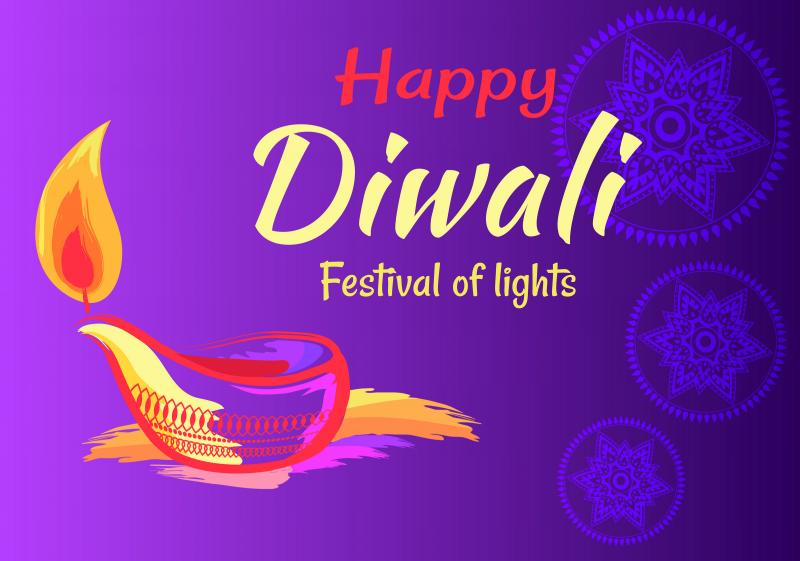Light and darkness have always dictated the rhythms of life; and humankind has always revered the light. Many of the world’s great religions have used light and darkness as metaphors for good and evil. One of the most joyous religious celebrations of light is Diwali, a festival whose name comes from the Sanskrit word dipavali, meaning “row of lights.” Primarily celebrated by followers of the Hindu, Sikh, and Jain faiths, Diwali “serves as a beacon of brightness every year, celebrating the victory of light over darkness, good over evil and knowledge over ignorance. It’s a time to gather with friends and family and bask in the light of each other’s company, while preparing for a fruitful year ahead.”[1] Diwali is a national holiday celebrated throughout India, Singapore, and several other South Asian countries and Asian immigrants have introduced this joyous celebration to people in the United Kingdom, United States, Australia, and elsewhere around the globe who now regularly celebrate Diwali with them. As the staff at Almanac.com note, “Though technically religious, it’s also become a cultural event in North America that’s celebrated with sweets and special foods.”[2]
A Brief History of Diwali
Because Diwali is practiced by different faith groups, its observances differ depending on region and tradition. Journalist Michelle Shen (@michelle_shen10) reports, “For Hindus, Diwali is a time for dana (charitable giving) and seva (selfless service), and according to the Hindu American Foundation, Hindus traditionally perform a deep cleaning of their homes and surroundings, as cleanliness is believed to invoke the presence and blessings of deities related to wealth and prosperity. Hindus also celebrate with colorful patterns of flowers, powder, rice or sand on the floor, an artistic practice called rangoli meant to bring good luck, says the Hindu American Foundation.”[3] Inni Kaur, creative director at the Sikh Research Institute, told Shen, Sikhs celebrate Diwali in memory of their sixth Guru, Guru Hargobind, who serves as a source of inspiration and a symbol for freedom. “The guru was in prison and refused to leave prison without the other 52 political prisoners being released. The day of Diwali celebrates his release, along with the other political prisoners he fought for, says Kaur. ‘The inspiration is to stand with the oppressed. It’s not about your freedom. It is about the freedom of everyone,’ Kaur says. Kaur says the Sikhs celebrate Diwali as a holiday to serve others and help the oppressed, similar to how the sixth Guru helped the other political prisoners. It’s a holiday for people to reflect what they are grateful for and how they can shine light on others as well, Kaur says.”
According to the Encyclopaedia Britannica, “For the Jain community, the festival commemorates the enlightenment and liberation (moksha) of Mahavira, the most recent of the Jain Tirthankaras, from the cycle of life and death (samsara). The lighting of the lamps celebrates the light of Mahavira’s holy knowledge. … Although not a primary festival of Buddhism, Diwali is celebrated by some Buddhists as a commemoration of the day when Emperor Ashoka converted to Buddhism in the 3rd century BCE. It is observed by the Vajrayana Buddhist minority among the Newar people of Nepal. They celebrate by lighting lamps, decorating temples and monasteries, and worshipping the Buddha.”[4]
Common traditions during all these celebrations include the presence of light, generally in the form of candles, the gathering of families, and food. The Almanac.com staff explains, “The main celebration of Diwali takes place on the day of the new Moon, when the sky is at its darkest, so a big part of the celebration revolves around light. Candles, clay lamps, and oil lanterns are lit and placed throughout the home, in the streets, in areas of worship, and floated on lakes and rivers. Fireworks are also set off on the night of Diwali — said by some to ward off evil spirits. Another central theme of Diwali is family. Wearing their best new clothes, families gather together to eat sweets and other special foods, light diyas (decorative oil lamps), and pray for their ancestors.” As that description implies, Diwali is a multi-day celebration and, unlike some holidays, its dates are not fixed. The Almanac.com staff reports, “Diwali occurs annually in autumn (or spring, in the southern hemisphere), during the Hindu month of Kartik. (To put it in Western terms, Kartik begins around mid-October and ends in mid-November.) Specifically, Diwali occurs on the darkest day of the lunar month, which is the day of the new Moon.”
Concluding Thoughts
The staff at DiwaliFestival.org writes, “Diwali, the festival of lights is the most awaited and the most celebrated festivals of India.”[5] Although Diwali remains relatively unknown in the Western world, the virtues honored by Diwali (i.e., victory of light over darkness, good over evil and knowledge over ignorance) deserve to be celebrated. Author Roy T. Bennett has written, “Each day brings new opportunities, allowing you to constantly live with love — be there for others — bring a little light into someone’s day. Be grateful and live each day to the fullest.” And the late Reverend Martin Luther King, Jr., once stated, “Darkness cannot drive out darkness: only light can do that. Hate cannot drive out hate: only love can do that.” Diwali reminds us we can be better people. Happy Diwali.
Footnotes
[1] Lizz Schumer, “What Is Diwali? The History Behind the Important Holiday,” Good Housekeeping, 29 October 2021.
[2] Staff, “Diwali 2022: What Is Diwali?” Almanac.com, 15 September 2022.
[3] Michelle Shen, “When is Diwali, and how is it celebrated? Plus, a few recipes for some sweet treats,” USA Today, 2 November 2021.
[4] Brian Duignan, “Diwali,” Encylopaedia Britannica.
[5] Staff, “Diwali,” diwalifestival.org.





